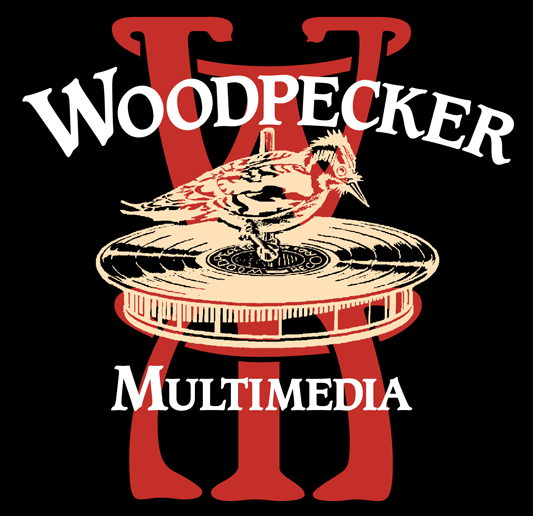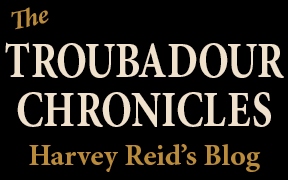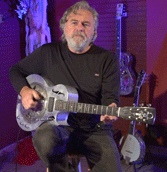 H
H 


|
|
This is part of an authorized online posting of Harvey Reid's important book, "The Troubadour Chronicles," published in May 2020. It is available in paperback from this web site or from Amazon.com.
Definition: “the formal statement of the meaning or significance of a word, phrase, idiom, etc., found in dictionaries…” [Dictionary.com] Chapter 4: The "Troubadour" WordAt the beginning of the book, we outlined the problem of finding a name for self-accompanied singers, and suggested that we might someday even acquire a new word. As one of the few survivors of a rather large group of archaic words for individual entertainers, “troubadour” seems to be the best existing word we have, though it has some baggage we need to address. Comedians are still called “jesters,” we still use the word “bard” for poets, and though it once was a fine word, modern references to “minstrels” are fewer. Outside the history books, no one mentions or has even heard of trouvères, troubarises, rimeurs, rimers, menestraux, jongleurs, guillari, minnesangers, chansonniers, westours, gleemen, clerwyr, or scalds. At some point the word “troubadour” was assigned what is threatening to become a permanently archaic meaning by the arbiters of poetry and dictionaries, and formally re-possessing and re-purposing the word is in the first group of tasks in 21st century troubadour awareness and education. I can’t do it myself, and not until we can effectively name our profession will we succeed in our educational endeavors or petitions for public recognition as one of the oldest and most valuable forms of music. The French word trouvère just means “searcher,” but the origins of the word troubadour remain unknown. In Provençal, trobar is to compose or invent, and trobador was the source of our modern word. In Vulgar Latin tropare meant to combine. The root troub is Spanish for “band” or group of singers, similar to the word “troupe.” In Arabic the word taroub means “melodious,” the word tarab refers to enjoying music and singing, and the word “dour” means “houses.” “D’or” means “of gold” in French, though trou is a “hole” and trou de ver is a “wormhole– and there are obvious similarities to the word “trouble.” Whatever the word means and wherever it came from, a troubadour awakening has been happening in slow motion in America since the early 20th century, when singing guitar, banjo and piano players began appearing prominently in both rural and popular music. The “troubadour” word only began to be widely used in the 1950s outside academia as that type of musician became increasingly visible and commercially important. The clumsy and imprecise label “singer-songwriter” is widely used, though the type of musician we are focusing on here is not necessarily a songwriter, and we deserve more than an inaccurate and hyphenated name. Interestingly, the entry-level, lowest-priced guitar in the first Sears & Roebuck mail-order catalog in 1894, that likely contributed measurably to that awakening, was the Troubadour model that sold without a case for $2.70 plus shipping. Maybe Richard Sears, Alvah Roebuck or some unnamed employee in charge of that section of the catalog had their finger on the pulse of American music more than anyone realized. Alas, the Dictionaries Fail Us... Dictionaries remain in stubborn denial about its modern meaning, and it would be interesting to find out when the current definition first became embedded. (Perhaps there is a dictionary museum somewhere.) I turned to my trusty 1976 American Heritage Dictionary as a reference point to see what it said about troubadours. That book was a landmark; one of its best-known features was that it marked the first time a popular and highly-respected American dictionary attempted to include the infamous “f-word.” The edition I have is rare because the word was quickly removed after outrage from conservative educators who refused to use it in schools or put it in libraries. (My favorite of a number of the definitions they gave was, “to mishandle; bungle. Usually used with up.” (The rarest edition of this dictionary followed mine, where they had removed all references to the “f-word” except the military word “snafu,” which contained the “f” as part of an acronym that was changed to “Situation Normal: All Fouled Up.”) This excellent 1976 dictionary told me that a troubadour was, “1) One of a class of lyric poets of the 12th and 13th centuries attached to the courts of Provence and Northern Italy, who composed songs in complex metrical forms.” 2) a strolling minstrel.” Apparently not enough members of their 105-member usage panel knew enough about the relationship of the word with modern songwriting or folksinging, and we’ll come back to that strolling thing. That dictionary tellingly did not contain an entry for the antiquated word trobairitz. Forty years later the same dictionary said: “1) One of a class of 12th-century and 13th-century lyric poets in southern France, northern Italy, and northern Spain, who composed songs in langue d’oc often about courtly love. 2) A strolling minstrel.” Not much progress visible there, other than adding Spain. The 2016 Webster’s New World Collegiate Dictionary rearranged the words to say the same thing, “1) any of a class of lyric poets and poet-musicians in S. France and N. Spain and Italy during the 11th through 13th cent. who wrote poems and songs of love and chivalry, usually with intricate stanza form and rhyme scheme 2) a minstrel or singer.” The 2018 Merriam-Webster dictionary says a troubadour is, “one of a class of lyric poets and poet-musicians often of knightly rank who flourished from the 11th to the end of the 13th century chiefly in the south of France and the north of Italy and whose major theme was courtly love.” These are almost identical to others I have found, though sometimes the second definition shows that someone tried to update it: “a singer, especially of folk songs,” though the more you examine the second definition the worse it is. Just being a singer or singing folk songs does not make you the kind of troubadour we’re talking about. It’s telling that both of these have yielded some turf to the Italians, since earlier definitions commonly mention only France. Dictionary.com now says a troubadour is, “1) one of a class of medieval lyric poets who flourished principally in southern France from the 11th to 13th centuries, and wrote songs and poems of a complex metrical form in ‘langue d’oc,’ chiefly on themes of courtly love. 2) any wandering singer or minstrel.” You may be wondering what they mean by “complex metrical form” and might be leaping to your dictionary to see what it says about “courtly love” and “langue d’oc.” We will address those in a later chapter. The definition problem is slowly improving, but we have a lot of pruning to do of terminologies surrounding the troubadour word, and results are lagging by many decades. Musicians need a word right now to name themselves, not in fifty years when today’s backwards-looking lexicographers are all dead.
As I scroll down my search results I find www.vocabulary.com, where they repeat the boilerplate stuff about troubadours and the Middle Ages but then somebody says beautifully, “We now call our troubadours ‘singer-songwriters’ or ‘recording artists.’” The “Urban Dictionary” says a troubadour is a “A singer/minstrel/poet of folk songs/literature. Troubadours were musicians.” This is pretty imprecise, and it clings to the “singer of folk songs” nonsense, but calling troubadours musicians and not just poets is on the right path, and gives me hope that we’ll get our word back some day. Folksingers “Folksinger” is by no means the ideal word for what I am choosing to call a troubadour; it too has baggage, and it’s almost a joke what dictionaries do with that term. First they wonder if it should be “folk singer” or “folk-singer,” and then they often get circular and vague, as if we all know what it is or don’t need a careful definition, which might even be the case. Dictionaries commonly do this, essentially punting a definition, like the way one of them defines “inspecific” as unspecific, nonspecific, “non specific” or “not specific,” and others that define traveling as journeying and journeying as traveling. Merriam-Webster says, “one who sings folk songs or sings in a style associated with folk songs” and their student dictionary is worse: “a person who sings songs (folk songs) created by and long sung among the common people.” Dictionary.com, where many people go for answers these days, says this, “a singer who specializes in folk songs, usually providing his or her own accompaniment on a guitar.” It’s hopeful that someone mentions self-accompaniment, but the “folk songs” thing torpedoes it, and it’s long past time to replace “his or her” with “their” just like we were told not to do a generation ago. Is it impossible to just say what it is nice and neatly, like dictionaries are supposedly so good at? It might be enough to simply reverse the two common definitions of “troubadour,” while adding the word [Archaic] in front of the long one, though the non-archaic modern definition is still too vague, unformed and elitist. It might be valuable to initiate some discussions about how to clarify the shorter one, since it is a little tricky to explain the difference between a troubadour performance and a piano student doing a clumsy solo recital. I know those lexicographers can do it, and the definition they arrive at might say something like: Troubadour: 1) a type of solo musician; a self-accompanied singer, who typically does not read music while performing; especially a musician who is self-employed, who often creates and arranges their songs. 2) [Archaic] “one of a class of medieval lyric poets etc…” They could even get really clever and say “Troubadour: Any modern version of the archaic medieval musician…” While we are strong-arming lexicographers, I also propose that it is also time to let go of the cumbersome and long-deceased word trobairitz, a truly archaic term for a female medieval troubadour, used only by a small subset of those academics who support Definition #1 [Archaic] of “troubadour.” There are only about 25 medieval female original Medieval troubadours that have been identified by historians, which isn’t really enough to justify adding two strange words to our language (the plural of trobairitz is the unpronounceable and unspellable trobairises), imposing a gender qualification where we don’t need one, and confusing public understanding of something it is already having trouble with in an era when non-binary, genderless thinking is starting to prevail. It’s Best Not To Call Us “Minstrels” Anymore Out of respect for the long suffering of African-American people and in honor of their vast contributions to American music, I don’t feel comfortable using the word “minstrel” to describe myself and my contemporaries, though it is less cumbersome and I have used it in the past. 350 years ago Thomas Percy wrote beautifully: “It is well known that on the Continent, whence our Norman nobles came, the Bard who composed, the Harper who played and sang, and even the Dancer and the Mimic, were all considered as of one community, and were even all included under the common name of Minstrels.” “Minstrel” was once a good word, actually better than “troubadour,” and much easier to pronounce and spell. The unfortunate adoption in the 1800s of the term minstrel in American culture for entertainers who impersonated, mocked, appropriated and painfully degraded African-American music and culture has deeply damaged the word. It is not easy to understand how that kind of mockery could have become so widespread, normal and accepted in the past, though history reveals no shortage of attitudes and practices from the past that are opaque to us now. For over a century the concept of the “minstrel show” was huge and widely popular, and remained even into my childhood in the 1950s in the legacy of Al Jolson, Amos & Andy and the ubiquity of Stephen Foster songs full of “darkies.” The painfully racist era of “coon songs” peaked around 1900, and dwindled steadily as the bookings were fewer, their range smaller, and the size of the casts and audiences ever-shrinking. I recently learned from local historian Dennis Robinson that my local 19th century theater in Portsmouth, New Hampshire hosted its last minstrel show as late as 1960 when C.B. Hicks and the Original Georgia Minstrels performed there, though they were an African-American version. I wonder how many of the 895 seats were filled and by whom, and what the show consisted of, since that group, originally founded in 1865, likely still had an all-black cast of performers. Did all the performers die of old age without any younger replacements, or did the bookings dry up first, and the old entertainers wither away somewhere? This troupe toured Asia and Europe, and according to newspaper clippings from decades earlier, they did coon songs and comedy along with the music. In 1960 it was probably heavy on horns and jazz, though there must have been a banjo. Billed as fun, comedy and entertainment, those shows must have been quite painful to some segments of the population, and they certainly grew increasingly so with the passage of time as the practices of that musical form become more and more outdated and unimaginable. Remnants of this minstrel shows and blackface era have ruined the word “minstrel” for too many people, though in the future it may again become a usable word. Happily, this complicated minstrel-show period had significant historical and cultural value, since it likely marked the beginning of the widespread dissemination of African musical ideas into America, and supercharged the gloriously fruitful mixing of European and African music that ultimately brought us gospel, blues, jazz, ragtime, rock & roll, rap and any number of other exciting new genres. Strolling, Wandering and Love Poetry Conclusions I would venture a guess that surprisingly little has changed much in 800 years within the ranks of troubadours, in terms of the proportions of male and female, old and young, rich and poor and assorted classes of musical people who have practiced the art form. I'm trying to raise issues, questions and awareness in the world of modern troubadours... I want people to find this in web searches and to read it. I don't have a way for you to comment here, but I welcome your emails with your reactions. Feel free to cheer me on, or to disagree... Chordally yours, HARVEY REID ©2021
|
